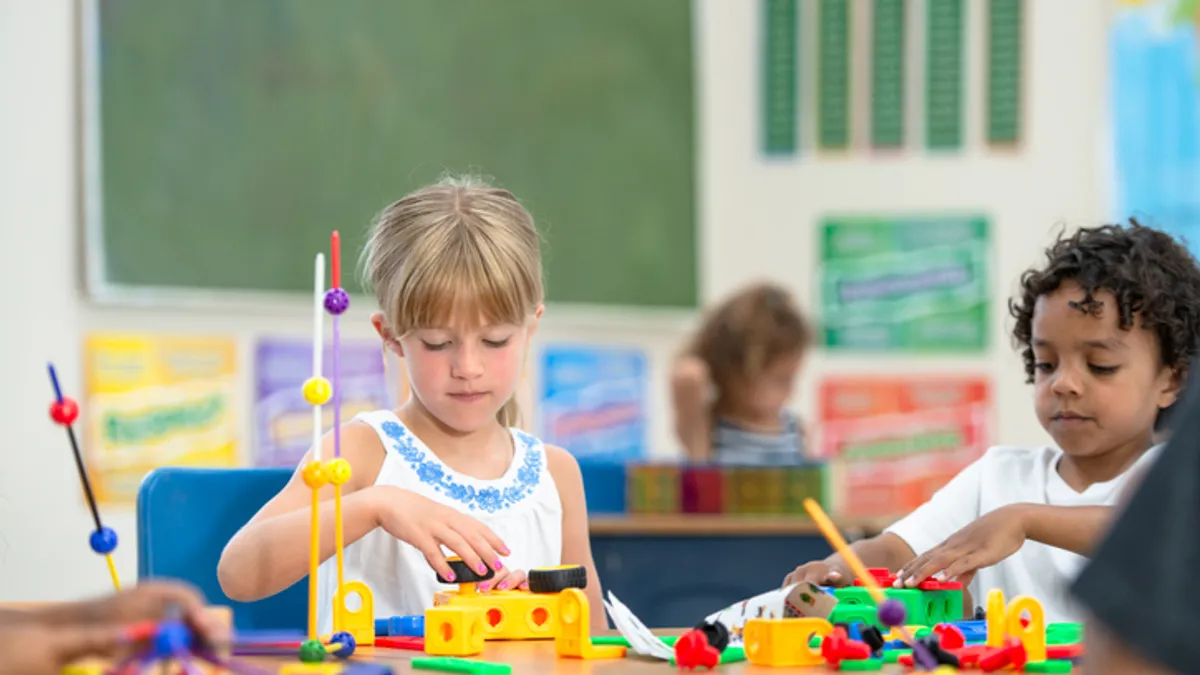Dive Brief:
- Kindergarten readiness assessments can reveal if children are in need of additional supports and identify students' baseline skill levels, but they can be time-consuming and disrupt the process of young students acclimating to school, according to teacher insights released Thursday by the U.S. Government Accountability Office, an independent watchdog of the federal government.
- Some teachers also voiced concerns about assessment accuracy and the assessments' relevance for instruction. Many states that require school districts to administer kindergarten readiness assessments are testing young students in multiple areas such as early literacy, early math, language skills, and social and emotional development, according to the research.
- GAO said little is known about kindergarten readiness skills nationwide, despite a general understanding that a student's early years in school are critical to the development of their future academic success.
Dive Insight:
Developmental information about kindergartners is taken at the beginning of the school year and can be collected through observation and individual assessments. Teachers surveyed by GAO researchers said administering multiple assessments — including those that are state-required — is time-consuming and challenging, as teachers are getting to know their students and as young learners are adjusting to school routines.
Some teachers did note that in response to timing concerns, schools have made scheduling adjustments, such as using alternative schedules at the beginning of the school year to accommodate testing.
Some teachers also noted that technology is needed for certain testing, and kindergartners may be unfamiliar with using devices. For those students, their assessment results may reflect a lack of technology skills rather than their knowledge about the content in the assessments.
Additionally, some teachers said assessment baseline data can quickly become outdated because of young learners' rapid knowledge growth. But some teachers also said they use testing data to assign learning groups of students with similar skill levels and to track learning growth over the school year.
Teacher input included in the GAO report came from group discussions with 30 teachers from six states that require kindergarten readiness assessments.
About 3.3 million children attend public kindergarten in fall 2024, according to the U.S. Department of Education. There is no federal mandate for kindergarten enrollment. States decide if school districts must offer kindergarten and if attendance is mandatory.
GAO found that just over half of states – 27 – required their school districts to administer a formal kindergarten assessment or screening during the 2023-24 school year, according to a GAO survey of the 50 states and the District of Columbia.
Nine states that don't require a formal kindergarten assessment collected readiness information through other methods. Minnesota and West Virginia officials, for example, said their states measure participating students' progress during their pre-kindergarten school year. Oregon had a pilot program that collected kindergarten readiness information through conversations with families.
Of the 22 states that analyze kindergarten readiness data, 77% said they do so to inform the public. Other reasons provided include to meet state legislative requirements and to inform state-provided professional development for kindergarten teachers.







 Dive Awards
Dive Awards





